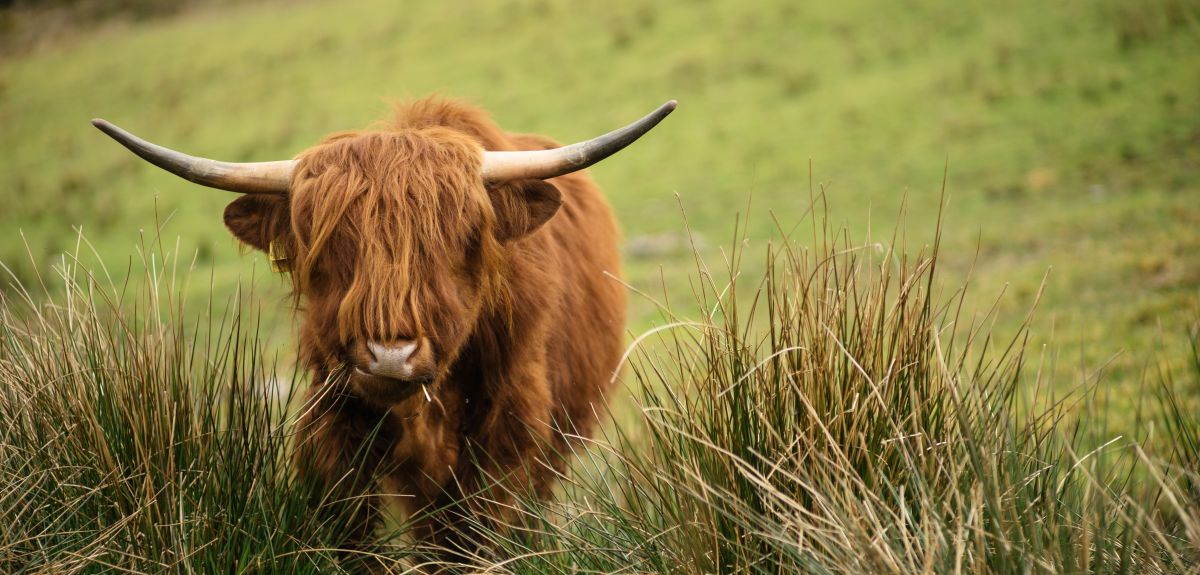Organic Beef More Effective Carbon Sequestration.
Is grass-fed beef good or bad for the climate Image credit: Shutterstock 
Is grass-fed beef good or bad for the climate?
An international research collaboration has revealed that the belief that grass-fed livestock are good for the environment may be misplaced. The newly published report suggests that not only are cattle pastures not a climate solution, they directly contribute to the problem.
The Food Climate Research Network (FCRN) at the University of Oxford's new 'Grazed and Confused' report, sheds light on the impact that grass-fed animals have on climate change, offering clarity to the debate around livestock farming and meat and dairy consumption. The authors dissect claims made by different stakeholders in the debate about so called 'grass-fed' beef, the greenhouse gases the animals emit, and the possibility that, through their grazing actions, they can help remove carbon dioxide from the atmosphere. It evaluates these claims and counterclaims against the best available science, providing an authoritative and evidence-based answer to the question: "Grazed and Confused? Ruminating on cattle, grazing systems, methane, nitrous oxide, the soil carbon sequestration question – and what it all means for greenhouse gas emissions". Written by Dr Tara Garnett of the FCRN, Cécile Godde at Australia's national science agency the CSIRO and a team of international experts, the report throws cold water on claims that grass-fed beef benefits the environment. Key findings include the observation that while grazing of grass-fed animals can boost the sequestration of carbon in some locally specific circumstances, that effect is time-limited, reversible, and at the global level, substantially outweighed by the greenhouse gas emissions they generate. when it comes to climate change, people shouldn't assume that their grass-fed steak is a climate change-free lunch. It isn't. Dr Tara Garnett, co-author and founder of the Food Climate Research Network at Oxford University Explaining the key takeaways from the report, Dr Tara Garnett, co-author and founder of the FCRN, said: 'This report concludes that grass-fed livestock are not a climate solution. Grazing livestock are net contributors to the climate problem, as are all livestock. Rising animal production and consumption, whatever the farming system and animal type, is causing damaging greenhouse gas release and contributing to changes in land use. 'Ultimately, if high consuming individuals and countries want to do something positive for the climate, maintaining their current consumption levels but simply switching to grass-fed beef is not a solution. Eating less meat, of all types, is.' Published just ahead of the COP23 United Nations Climate Change Conference in Bonn, the report places emphasis on the need to consider animal production and meat consumption, if we are to reach the climate goal of a 2-degree warming limit. More than laying out the bones of the grass-fed grazing dispute, the report also helps fill the knowledge gaps about emissions and sequestration, and aims to provide more nuance to the debate. The work reflects two years of close collaboration between researchers at the Universities of Oxford, Aberdeen and Cambridge in the UK; Wageningen University & Research in the Netherlands; the Swedish Agricultural University; CSIRO in Australia and the Research Institute of Organic Agriculture (FiBL) in Switzerland. It is aimed at policy makers, the food industry, civil society and all those concerned with the future of land use, climate change, and the role of livestock in a sustainable food future. Lead author Cécile Godde explains the focus on climate and the significance of these questions for the overall debate on land use and environmental sustainability: 'The big question' that needs answering is whether farmed animals fit in a sustainable food system, and if so, which farming systems and species are to be preferred. Of course, there are many dimensions to sustainability and this report only considers one of them - the climate question. But the climate question alone is important to explore and in doing so, this report takes us a step further towards understanding what a sustainable food system looks like.' Dr Tara Garnett adds: 'When thinking about different livestock production systems there are many important aspects to consider: people's livelihoods and jobs, animal welfare, biodiversity, nutrition and food security and more. Grazing systems and grass-fed beef may offer benefits in these respects, benefits that will vary by context. But when it comes to climate change, people shouldn't assume that their grass-fed steak is a climate change-free lunch. It isn't.'
#Grassfed #beef may have benefits - but saving us from #climate change isn't one of them. #Grazedandconfused report: http://bit.ly/2xztwmt Tweet this We would appreciate your support in helping us share the report's findings in your networks.
![]()
Latest
Source: https://www.ox.ac.uk/news/2017-10-03-grass-fed-beef-good-or-bad-climate
0 Response to "Organic Beef More Effective Carbon Sequestration."
Enregistrer un commentaire